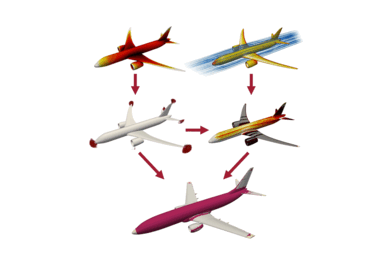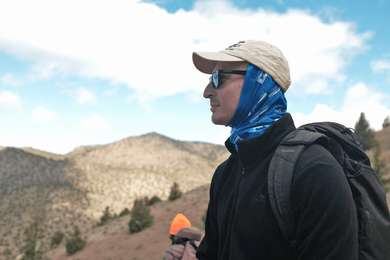New rigorous learning environments, cultural expansion, career insight, and renewed confidence are just some of the benefits cited by MIT students participating in the new MIT-Imperial Academic Exchange.
Launched last fall as a two-year pilot, the exchange offers undergraduates in specific departments the opportunity to study abroad at Imperial College London for one semester or a full year. As part of the exchange, a cohort of Imperial students are studying at MIT this academic year. The program will be evaluated after each year of the pilot for learning outcomes and overall benefits to participants.
Two chemical engineering students — Julia Pallone and Anjolaoluwa “Anj” Fayemi — represented MIT in the exchange’s inaugural 2018-2019 semester, which lasted from September through early January. The juniors took courses in Imperial’s chemical engineering department that will earn them transfer credit at MIT and were able to take other classes as well. Living in university housing close to Imperial’s campus, they participated fully in extracurricular activities and immersed themselves in London’s stimulating cultural environment.
“I felt most enriched by the seemingly unlimited opportunities to learn inside and outside the lecture halls,” Pallone says. “Initially I was challenged by the prospect of being in a completely unfamiliar place and needing to still fulfill my academic requirements as well as try to find interesting extracurriculars. I soon learned, though, that Imperial is full of supportive students and staff, particularly in the exchange network and my academic department. The chemical engineering faculty member in charge of advising exchange students, who was also my Reaction Engineering I professor, was very helpful throughout the entire process of registering for classes and making sure I was settled at Imperial.”
Fayemi describes the teaching at Imperial as “similarly rigorous to MIT.”
“You really have to be self-directed," he says. “I learned important skills in self-discipline and how to be responsible for myself.”
This is especially true as Imperial requires few assignments during terms and grading is largely dependent on one final exam. Fayemi began exploring business classes, which provided a global perspective and awakened his interest in entrepreneurship. He has now added an entrepreneurship concentration to his major at MIT, and is completing the StartMIT course at the Martin Trust Center and receiving mentorship for his future plans.
Both students note Imperial’s strong emphasis on industry, which complemented the theoretical training of their MIT education.
“The guest speakers from industry offered context to what we were learning, as well as the focus on using practical software for coursework,” says Pallone. “I found that the focus on industry applications really enhanced all the theory I have learned and gave me a better big-picture understanding of the purpose and consequences of decisions in chemical engineering.”
For Fayemi, his experience at Imperial encouraged him to take advantage of MIT’s options for chemical engineering majors to explore career opportunities outside of their field.
Pallone and Fayemi enjoyed their activities outside of class and the chance to meet diverse people. Pallone dove headfirst into Imperial’s student-led groups. She ran with the cross country and athletics club, sailed in the English Channel with the yacht club, and explored the myriad of exhibits at the Victoria and Albert Museum, located next-door to the campus.
Fayemi played first-team football (soccer), was a member of the African-Caribbean student society, and attended shows at the Royal Albert Hall, which is also located at the edge of Imperial’s campus. He found the Freshers’ Fair (similar to MIT’s activities midway) a great opportunity to learn about Imperial’s hundreds of student clubs and societies. “Joining a club is an excellent way to meet new people, not just exchange students,” he says.
The newest cohort of MIT students arrived at Imperial in early January to begin their studies for the spring and summer terms, which run until mid-June. They include four electrical engineering and computer science students — Lily Bailey, Michael Hiebert, Dain Kim, and Chase Warren — as well as Sara Wilson from materials science and engineering.
“Imperial has exceeded my expectations,” reports Warren. “The Imperial students are incredibly welcoming, and are excited to meet MIT students. Downtown London is very accessible and has even more exciting things to offer, and it’s very easy to get around London in general. The staff for international/abroad/exchange students here has been very supportive and friendly.”
Wilson was attracted to participating in the academic exchange after spending last summer with the MIT-Imperial Summer Research Exchange. In addition to taking materials science and engineering courses at Imperial this semester, she has returned to her research project in Imperial’s biomedical materials science lab, where she is helping synthesize semiconducting polymer nanoparticles for biosensing applications. The impetus to study abroad emerged from Wilson's desire to “test my ability to adapt to new environments and grow.”
“The MIT-Imperial Exchange felt like the perfect opportunity to do just that.” Kim reflects. “Being an international student I’ve always been aware of the personal growth that comes with meeting people from diverse cultures. I wanted to get out of the MIT bubble and learn how my peers from other institutions and countries learn and think, and how their values and aspirations differ from mine.”
While Imperial’s educational structure can put pressure on students to independently stay on top of their academics, the absence of Psets also offers more free time.
“I’m planning on doing the things at Imperial that I never had time for at MIT,” attests Wilson. “I plan to join the anime club, start taking piano lessons again, and finally learn how to cook! I hope that I’ll finally start building my life and discovering what I enjoy outside of academics.”
The students anticipate that their study abroad at Imperial will also engender insights and rewards for the future. “I am using this semester to explore other potential careers and spend some time networking with people here in London,” states Bailey. “I have always dreamed of eventually working abroad, either in the UK or elsewhere in Europe, so I plan to leverage my time here to begin to investigate how I might go about making that happen.”
Global fluency — with its benefits for life after MIT — is an additional goal for the students.
“I hope this experience furthers my global thinking and ability to adapt to changing environments — professional, educational, etc.,” says Warren. “Being comfortable in foreign cities will allow me to widen my scope of professional possibilities. I hope that my ability to connect with people from around the world improves and translates to professional success.”
The Global Education Office (GEO), part of the Office of Experiential Learning (OEL), manages the MIT-Imperial Academic Exchange in partnership with participating MIT academic departments and with counterparts at Imperial. GEO’s work includes the recruitment and admission process, student preparation, and support during and after the exchange experience.
“It is very gratifying to hear from Julia and Anj how much they enjoyed and gained through their participation in the fall semester exchange,” says Malgorzata Hedderick, the associate dean of GEO. “I am impressed by the observations and goals of the students starting their spring semester at Imperial. In our work, we hope that students will be able to amplify the benefits of their MIT education by adding important skills and insights from the study abroad experience and this is what we are seeing in this Program already.”
In March, GEO will begin selecting the next cohort of MIT students for spring 2020 participation in the MIT-Imperial Academic Exchange.











